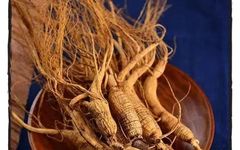

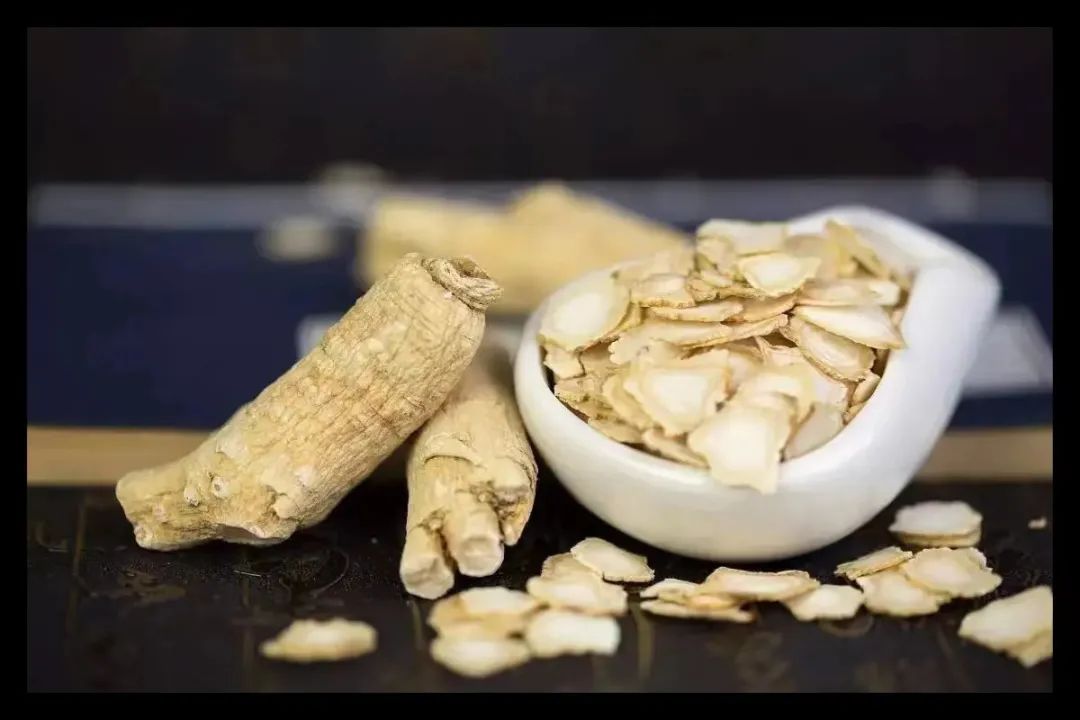
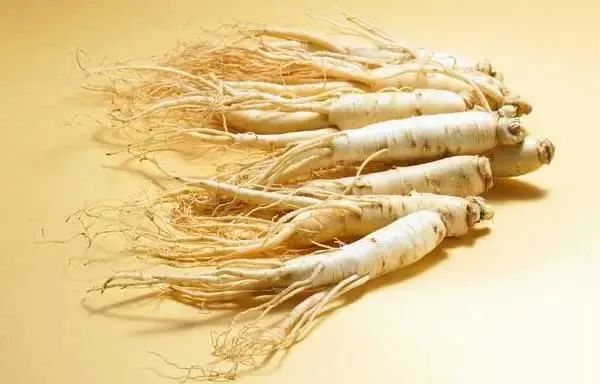

Ginseng (Rénshēn) is the root of the perennial herbaceous plant from the Araliaceae family. The wild variety is known as wild ginseng (Yěshānshēn), while the cultivated variety is referred to as garden ginseng (Yuánshēn). It is primarily produced in the northeastern provinces of China, with the highest quality and yield found in Fusong County, Jilin Province, hence it is called Jilin ginseng (Cháoxiǎnshēn in Korean). Ginseng has a cylindrical or spindle shape, with long, thin root hairs resembling a miniature version of a large tree root. The root has a short rhizome, and its leaves are palmate compound leaves, typically with 2 to 6 leaflets arranged in whorls at the stem apex. The age of the ginseng can be determined by the number of leaflets, which have finely serrated edges. Generally, ginseng is harvested after six to seven years of cultivation. When the fruit pulp matures, it is bright red, and the roots are harvested in the autumn when the stems and leaves wither. The roots are then processed: the top is removed, cleaned, and dried to produce raw ginseng (Shēngshàoshēn); after being blanched in boiling water and soaked in sugar syrup, it is dried to produce white ginseng (Tángshēn); steaming and then drying produces red ginseng (Hóngshēn); the fine roots are called ginseng hairs (Shēn xū).
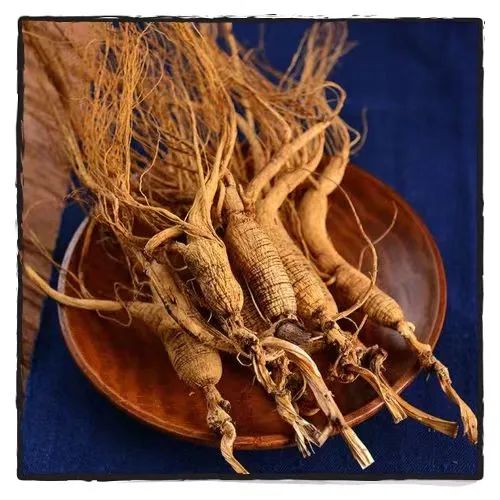
Aliases: White ginseng (Báishēn), Red ginseng (Hóngshēn), Wild ginseng (Yěshānshēn), Jilin ginseng (Jílínshēn), Direct ginseng (Biézhíshēn)
Taste and Properties: Sweet, slightly bitter, slightly warm. Channels entered: Spleen (Pí), Lung (Fèi).
Functions: Greatly tonifies the original qi (Yuánqì), stabilizes the pulse, generates fluids, nourishes the blood, calms the spirit, and enhances intelligence.
Applications:
1. For qi deficiency and impending collapse. In cases of significant blood loss, severe vomiting or diarrhea, and any disease leading to extreme deficiency of original qi, symptoms may include weakness and a faint pulse. Original qi is the fundamental energy of the body, and this herb can greatly tonify it, thus having the effect of rescuing from collapse. It can be used alone in a large decoction, known as Ginseng Decoction (Dúshēn tāng), which is an effective remedy for tonifying qi and stabilizing collapse. If there are accompanying symptoms of sweating and cold limbs indicating yang deficiency, it can be combined with Aconite (Fùzǐ) to enhance the warming effect, known as Ginseng and Aconite Decoction (Rénshēn Fùzǐ tāng).
2. For spleen qi deficiency. The spleen and stomach are the foundation of postnatal life and the source of transformation and transportation. If spleen qi is insufficient, it can lead to fatigue, poor appetite, abdominal distension, vomiting, and diarrhea. Ginseng can greatly tonify original qi and benefit spleen qi, thus suitable for spleen qi deficiency. It is often combined with Bai Zhu (White Atractylodes), Fu Ling (Poria), and roasted Gan Cao (Licorice) to strengthen the spleen and stomach, as in the Four Gentlemen Decoction (Sìjūnzǐ tāng).
3. For lung qi deficiency. The lungs are the organ responsible for qi. If lung qi is deficient, symptoms may include shortness of breath, fatigue, spontaneous sweating, and a weak pulse. Ginseng can greatly tonify original qi and benefit lung qi, thus effectively treating lung qi deficiency. It is often used with Walnuts (Hú táo) and Gecko (Héjiā) in formulas like Ginseng and Walnut Decoction (Rénshēn Hú táo tāng) and Ginseng and Gecko Powder (Rénshēn Héjiā sǎn). Ginseng can also regulate immune function and is used to enhance immunity.
4. For fluid damage and thirst. Ginseng can benefit qi, generate fluids, and relieve thirst, suitable for heat diseases with damage to both qi and fluids, characterized by fever and thirst, profuse sweating, and a weak pulse. It is often combined with Gypsum (Shígāo), Anemarrhena (Zhīmǔ), Licorice, and Japonica Rice (Jīngmǐ) in formulas like White Tiger Decoction with Ginseng (Báihǔ jiā Rénshēn tāng) to clear heat, benefit qi, and generate fluids; for heat damaging both qi and yin, with thirst and profuse sweating, it can be combined with Mai Dong (Mài dōng) and Schisandra (Wǔwèi zǐ) in formulas like Generating Pulse Powder (Shēngmài sǎn) to benefit qi, nourish yin, relieve thirst, and stop sweating. It is also used to treat diabetes, often combined with Sheng Di (Shēng dì), Xuan Shen (Xuán shēn), and Mai Dong to nourish yin and generate fluids.
5. For restlessness, insomnia, excessive dreaming, palpitations, and forgetfulness. Ginseng can greatly tonify original qi and has calming and intelligence-enhancing effects, which can protect against fatigue and improve memory. Thus, it is suitable for symptoms caused by qi deficiency and blood deficiency. It is often combined with Angelica (Dāngguī), Longan (Lóngyǎn ròu), and Sour Jujube Seed (Sūnzǐ rèn) in formulas like Returning the Spleen Decoction (Guī Pí tāng). Additionally, ginseng has the effect of tonifying the kidneys and strengthening yang, suitable for kidney deficiency and impotence. For treating blood deficiency, it is often combined with Shú Dì (Shú dì) and Dāngguī to benefit qi and blood, enhancing efficacy; for impotence, it can be combined with Deer Antler (Lùróng) and Placenta (Tāi pán) to tonify qi and strengthen yang. For cases of deficiency with external pathogens or internal excess, it can be combined with exterior-releasing and interior-strengthening herbs to support the righteous and expel evil.
Dosage and Administration: 5-10g, preferably decocted with gentle heat, and the ginseng juice should be mixed with other herbal decoctions for consumption. It can also be ground into powder and taken in doses of 1-2g, 2-3 times daily. In cases of rescuing from collapse, a large dose (15-30g) should be decocted and administered in divided doses.
Precautions and Contraindications:
1. Ginseng should not be consumed with Li Lu (Lí lù), Wǔ líng zhī, or Soapberry (Zàojiǎ).
2. It is not suitable for those with excess heat syndrome, damp-heat syndrome, or those with sufficient righteous qi.
3. When using ginseng for tonification, the ginseng stem (shēn lù) should be removed, as it has the side effect of inducing vomiting.
4. When decocting ginseng, avoid using iron utensils.
5. It is best not to drink strong tea while taking ginseng.
6. There are many ancient texts that record adverse interactions with white radish, but this remains controversial.
7. Patients with arteriosclerosis, high blood viscosity, insomnia, gastric diseases, cholecystitis, gallstones, and hypertension should avoid ginseng.


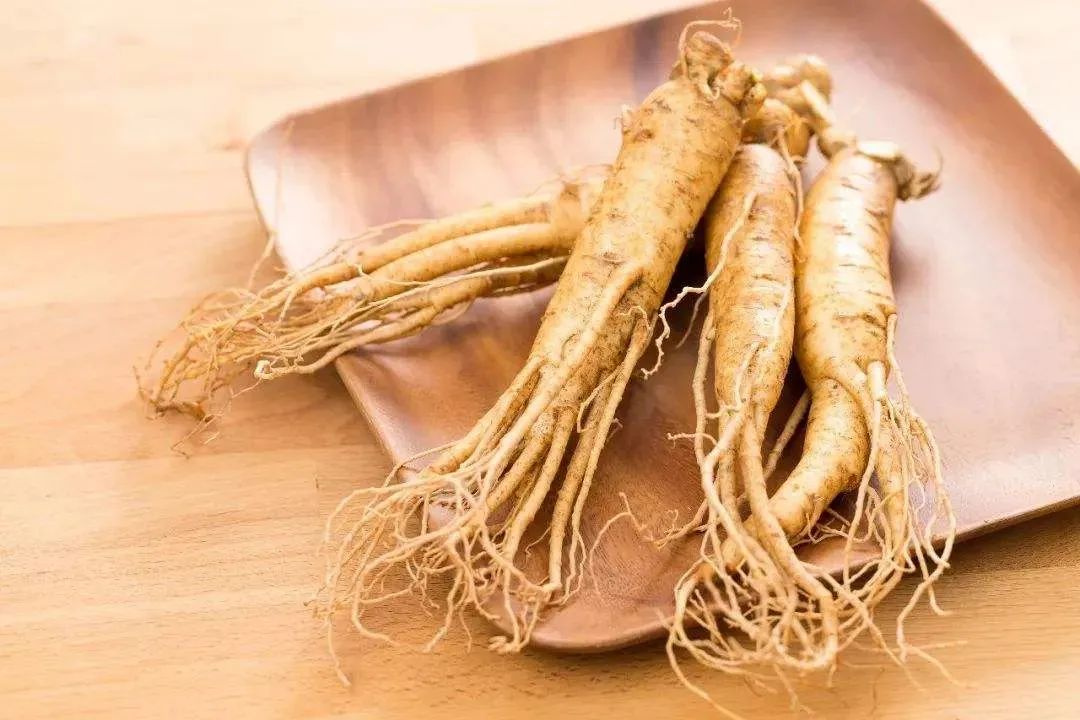

 Legends of Ginseng
Legends of Ginseng
People often say that Northeast China has three treasures: ginseng, sable fur, and Ural grass. Ginseng is the most precious of the three, capable of tonifying qi and blood, and generating body fluids, making it a valuable medicinal herb. The Changbai Mountain area in Northeast China is the homeland of ginseng. For centuries, many colorful stories about ginseng have been passed down, including a beautiful legend about the Ginseng Maiden.
Long ago, on a hillside in Changbai Mountain, there lived a Ginseng Maiden and her younger brothers. The area was picturesque, with clear waters and lush vegetation, and the Ginseng Maiden and her brothers lived a carefree life.
This spring, as the ice and snow melted, a group of ginseng diggers arrived, setting up a shelter to search for ginseng on the hillside. However, after seven or eight days of searching, they had not seen a single ginseng leaf, and everyone was feeling a bit discouraged. The leader, an old man nicknamed “Mountain Guide,” told everyone that the area was beautiful and lush, and there must be large ginseng roots, encouraging them not to lose heart. Everyone felt reassured and continued to search carefully on the hillside.
During these days, the Ginseng Maiden and her brothers hid and were very frightened. One night, the Ginseng Maiden discussed with her brothers about moving to another hillside while she stayed behind to guard their home, planning to return for them after the diggers left. Her brothers were afraid that the diggers would catch her and insisted that she come with them. The Ginseng Maiden assured them that she could run over nine hills in a day, and the diggers would not catch her, so they should not worry. While they were discussing, one of the diggers named Jin Bao came out to relieve himself. Hearing voices on the hillside at night, he wondered who else could be there. He quietly approached and saw a beautiful girl and several little boys discussing something. In his surprise, he stepped on a dry branch, which snapped loudly, causing the girl and boys to disappear.
Jin Bao returned to the shelter and told “Mountain Guide” what he had seen. “Mountain Guide” understood that they had encountered the Ginseng Maiden. He asked for the exact location, and the next morning, he sent Jin Bao and the others straight there.
They searched for a long time but found nothing. Suddenly, “Mountain Guide” shouted, “棒槌” (Bàngchuí, a local term for ginseng), and everyone rushed over to see what was happening. “Mountain Guide” told them he had just found a ginseng root with two bright red seeds, but when he called out, it vanished. This was the Ginseng Maiden, who could run over nine hills in a day. Hearing this, everyone became excited and urged “Mountain Guide” to lead them to chase after the Ginseng Maiden.
“Mountain Guide” led them over eight hills, and at each hill, people saw her shining eyes, realizing that this was a rare find. The wealthy man among them, who was knowledgeable, offered a high price to buy the ginseng.
The wealthy man gathered his family and took out the precious ginseng, striking it with a golden rod on a silver plate, asking the Ginseng Maiden to pour two cups of tea. At that moment, the ginseng on the silver plate spun around and disappeared, but suddenly a girl of about fourteen or fifteen appeared, holding two cups of tea and placing them on the table. The family was astonished. The wealthy man struck the silver plate again, asking the Ginseng Maiden to find ten more ginseng roots. The Ginseng Maiden blushed, spun around on the ground, and as she did, a white smoke rose, and she vanished in an instant. When they looked again, the ginseng was also gone from the silver plate.
That night, Jin Bao saw the Ginseng Maiden again in Changbai Mountain. The Ginseng Maiden thanked Jin Bao for his kindness and invited him to stay in the mountains with her to take care of the ginseng children. From then on, the ginseng children in Changbai Mountain grew plump and healthy, and they could be found all over the mountains, easily seen by kind-hearted people, while bad people could not find them, as the ginseng children had learned to run over nine hills in a day, making it impossible for the bad people to catch them.
Some materials sourced from the internet
Professional Review| Xiao Zhiyong, Deputy Chief Chinese Medicine Pharmacist
Illustration and Text | Zhong Lanhua Edited by | Zhong Lanhua Reviewed by Shen Xiaoxian Approved by Chen Yaoshan Shanshan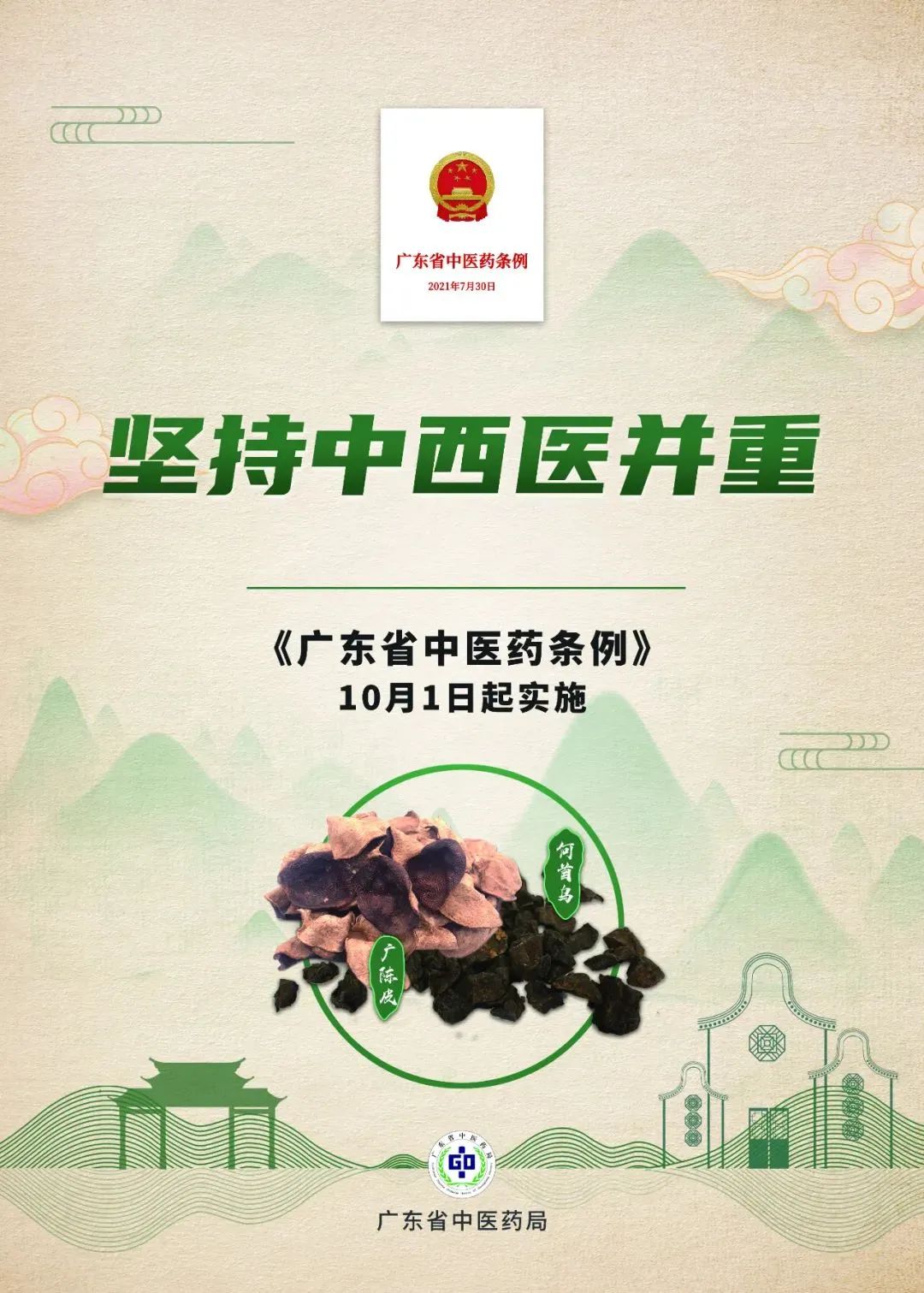 United Against the EpidemicWith You TogetherScan to Make an Appointment
United Against the EpidemicWith You TogetherScan to Make an Appointment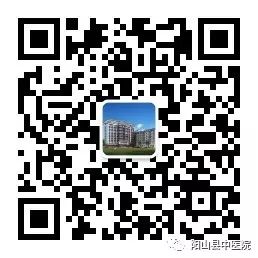
 仁爱 和致 精勤 诚谨
仁爱 和致 精勤 诚谨

